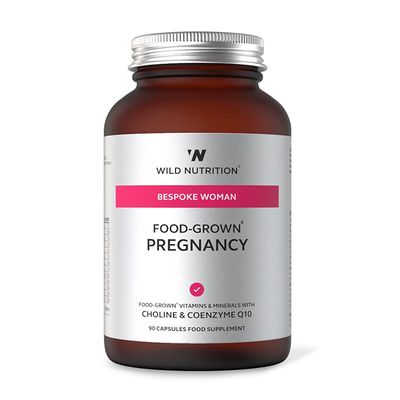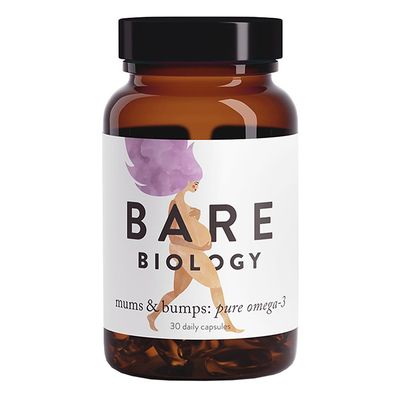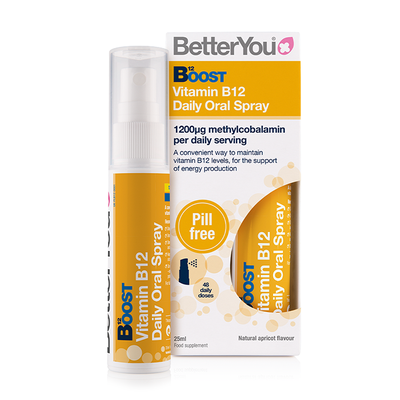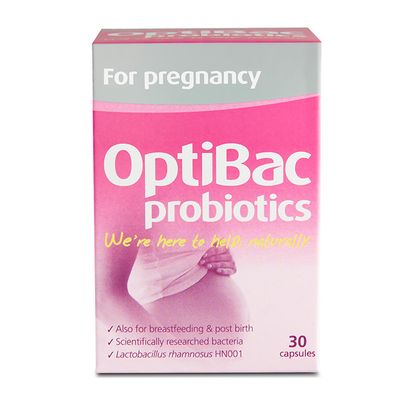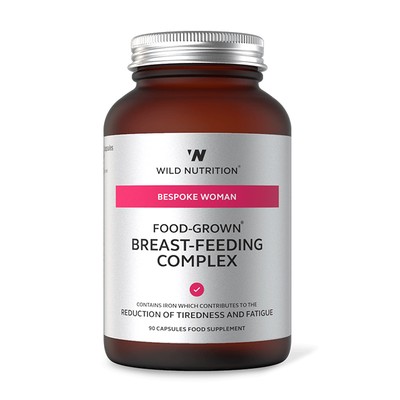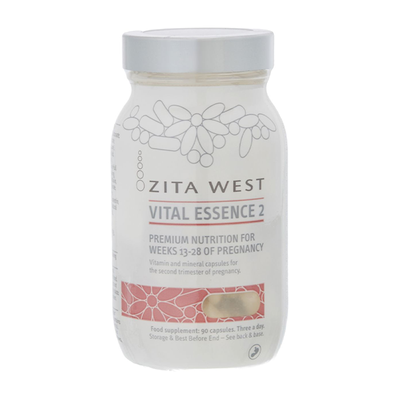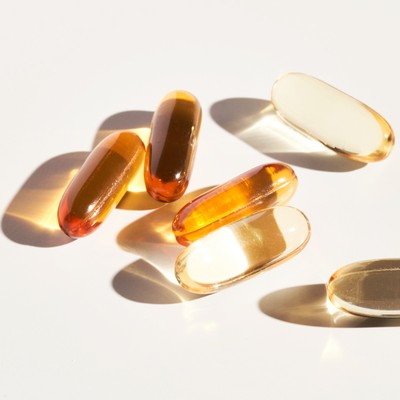
The Supplements To Take Before, During And After Pregnancy

Prioritise Nutrition
“If you’re looking to optimise your fertility, a little forward planning goes a long way. I’d even go so far as to say it takes 12 months to make a baby, not nine. Eggs need to be the best quality possible – the conditions that your cells are exposed to during the three to four months prior to conception are critical. Ensuring you are eating well and living a healthy lifestyle can make a significant difference to fertility. Remember you can’t out-supplement a bad diet, so focus on eating whole foods and limit your intake of highly processed foods. Having said that, studies show that couples who take nutritional supplements to support a healthier diet have quicker conception rates than those who don’t, and a multivitamin can reduce miscarriage rates and improve pregnancy outcomes.” – Alison Hall, registered nutritional therapist and functional medicine practitioner
Start Taking Folic Acid
“Vitamin B9 is an essential nutrient in both preconception nutrition and early pregnancy. It’s referred to as either ‘folic acid’ or ‘folate’ – folate is the natural food-derived form of vitamin B9 and folic acid is the synthetic type. It’s of particular importance during the first 12 weeks of pregnancy, playing an important role in the development of foetal circulatory and nervous systems. Deficiency in a mother during early-stage pregnancy is linked to neural-tube defects such as spina-bifida, as well as early miscarriage. Supplementing 400 µg per day, from pre-conception up to 12 weeks of pregnancy, is recommended. Ideally, start taking folic acid before conception, or as soon as possible once you find out you are pregnant. Intake should be supported through the diet, too, so eat plenty of green, leafy vegetables, broccoli, avocado, lentils and edamame.” – Ellie Clarke, nutritional therapist
Up Your Vitamin D
“Also known as the sunshine vitamin, vitamin D is associated with improved pregnancy rates and more success with IVF, while deficiency is linked to pregnancy complications such as hypertension, gestational diabetes and preterm birth.” – Alison
Don’t Forget Omegas
“When trying to get pregnant, aim to eat two portions of oily fish per week and take an omega-3 supplement in addition. Consumption of DHA fatty acids has been shown to increase levels of progesterone, a hormone that regulates the condition of the lining of the uterus. Omega-3 fatty acids also support brain and eye development in babies. Two portions of oily fish (with one serving being around 140g) is plenty due to levels of mercury found in fish from contaminated waters. Aim for wild salmon, kippers, mackerel and sardines to be on the safer side.” – Victoria Wells, nutritionist at Emma Cannon Clinic
Give Your Body A Helping Hand
“If conceiving is taking longer than expected, supporting the body with a quality fertility-focused supplement can be effective. Try Wild Nutrition’s Women’s Food Grown Pregnancy, a supplement I often recommend to my clients.” – Ellie

Try Vitamin B To Ease Nausea
“One woman’s experience of morning sickness is very different to another, and the same goes for what works to prevent or provide relief. From a supplement perspective, taking 25mg of vitamin B6 every eight hours can provide relief from morning sickness. Just be careful not to exceed 200mg per day – and note that some prenatal vitamins already contain B6, so remember to factor that into your daily allowance.” – Ellie
Give A Spray Supplement A Go
“If your gag reflex is heightened, consider taking your vitamins in a spray or dropper formulation. You may also want to think about taking your vitamins via a patch – PatchMD’s products come highly rated. If you are feeling nauseous, always take your prenatal supplement with food rather than on an empty stomach, as this can reduce feelings of nausea. NaturoBest’s Prenatal Trimester One supplement, which contains ginger, is also worth trying if you can stomach a capsule. Ginger capsules can also help.” – Alison
Eat More Iron
“An estimated 20% of women in Europe are anaemic during pregnancy, and low levels can make you feel tired throughout all three trimesters. It’s for this reason that you are screened routinely at the beginning of your pregnancy by your GP or midwife. Getting iron from food is the best approach – rich sources include dark green vegetables, chicken, grass fed beef, lentils and dried organic apricots. Eat these alongside a source of vitamin C for optimal absorption.” – Alison
Boost Your Antioxidants
“We know that free radicals attack cells and speed up the ageing process, but did you know they are just as important for a healthy pregnancy? Everything in the body that is made of cells needs to be protected, and this includes the egg and sperm. If you drink, smoke or have a poor diet, this will increase your free radical load, which in turn can damage the egg and sperm. Ensure your diet is rich in antioxidants, which will neutralise these free radicals – brightly coloured fruit and vegetables are the richest sources. A supplement containing vitamin C, selenium and pine bark can also help.” – Zita West, fertility expert
Think About Your Gut
“It’s important that your microbiome is optimised for your baby, so try to focus on your gut health when pregnant. There are special probiotic supplements designed for pregnancy – I recommend OptiBac for Pregnancy, which is suitable for pregnancy, post-birth and breastfeeding.” – Victoria Wells
Have Eggs For Breakfast
“Choline is an important nutrient during pregnancy yet is often overlooked, even in some of the leading prenatal formulas. It is vital for embryonic brain and neutral tube development, as well as for placental function. Eggs provide one of the richest sources of choline, with two eggs getting you close to the 450mg daily recommended intake during pregnancy. Other sources include salmon, red meat and poultry. Choline is found in plant produce (especially broccoli, peanut butter and shiitake mushrooms) but is far less concentrated, making it trickier to achieve the required doses.” – Alison
Be Aware Of Vitamin A
“Vitamin A is fat soluble, meaning it’s able to be stored in the body and can accumulate over time. Although vitamin A is important for foetal development and immune function, too much vitamin A can be harmful to foetal health. For this reason, supplementing with vitamin A during pregnancy isn’t advised, and similarly avoiding high vitamin A-containing foods such as liver or pâté is recommended. Vitamin A found in plant foods, such as spinach carrots, sweet potatoes and mangoes, is fine.” – Ellie

Continue Taking A Multivitamin
“The fourth trimester – the 12-week-period immediately after birth – is a period of recovery and physical and emotional change. After pregnancy, your body needs to heal from labour, produce breast milk and replenish depleted nutrients. Focus on nourishing your baby and yourself – protein needs are increased at this time, and if you are breastfeeding you will need more energy. Continue taking a pregnancy multivitamin that contains vitamin D as well as a probiotic with live cultures to support breastfeeding.” – Victoria
Start Taking Zinc
“Zinc is a brilliant nutrient to support immunity and healing. It’s specifically needed by newborns, so if a mothers’ levels are low prior to birth or while breastfeeding, your stores could be depleted and this may lead to a very unsettled baby. Nuts, seeds, pulses, wholegrains, seafood and red meat are good sources. Nuts and seeds are also rich in vitamin E, which can support wound healing and hormonal balance.” – Victoria
Consider An Adaptogen
“Ashwagandha is a wonderful adaptogenic herb to take during the post-partum period as it can help calm the nervous system and restore energy. If you have time, the occasional bath with magnesium salts can also soothe overworked muscles, tired minds and aid healing down below.” – Ellie
Stock Up On Bone Broth
“It’s easy to assume that nutrition during pregnancy is what matters most, and once the baby is born you can eat whatever you like. However, your nutritional needs are actually higher when breastfeeding, compared with pregnancy. Nourishing bone broths and slow-cooked meats are fantastic during this period – they are rich in glycine, which your body uses to make collagen to support healing, as well as electrolytes and lots of micronutrients.” – Victoria
Increase Your Calories If Breastfeeding
“Breastfeeding mothers burn on average an extra 500 calories per day for those first six months postpartum, so pay attention to when you are hungry and listen to your body. When breastfeeding, try to eat two portions of oily fish per week, which your baby will need for healthy fats; orange fruit and veg, which are rich in vitamin A, and lots of new mothers are deficient after birth; and sesame seeds, which are rich in calcium and requirements increase considerably during lactation. To prevent your own calcium stores being drained, up your intake – this could be a tablespoon of tahini on oatcakes or a handful of seeds as a snack.” – Victoria
Worried About A Deficiency?
“Pregnancy can be a rollercoaster – some days you may be full of energy while on others you are plagued with nausea. Most pregnancy complaints are not serious but keep an eye out for feeling constantly tired or weak; dizziness, shortness of breath; palpitations; pins and needles; pale skin; difficulty concentrating; and oedema (swelling of the ankles and hands). These could all be signs of nutrient deficiencies which may lead to issues such as a low thyroid function. Contact your GP or midwife in the first instance – the NHS can run a number of nutrient tests including iron, folate, B12 and vitamin D. Further testing can be carried out privately.” – Alison
Here, the experts share their favourite pregnancy supplements…
Wild Nutrition Food Grown Pregnancy, £34: “This comprehensive supplement will support you through all three trimesters and is great for the post-natal period, too.” – Ellie
Mumps & Bumps Omega-3 Fish Oil Capsules, £19: “Bare Biology offers some of the purest omega oils, which can contribute to the healthy development of foetal and infant brain and eye development.” – Ellie
Cytoplan Omega 3 Vegan, £24.80: “Derived from micro algae, this omega-3 supplement is suitable for vegans and is pregnancy and breastfeeding safe.” – Ellie
BetterYou Vitamin B12, £9.95 (was £11.95): “This is great for expectant mums having trouble swallowing pills when morning sickness is a problem. Vitamin B12 is important when both pregnant and breastfeeding.” – Ellie
OptiBac for Pregnancy, £18.99: “Suggested for daily use from conception onwards, these probiotics are great for pregnancy, post-birth and breastfeeding.” – Victoria
Wild Nutrition Breastfeeding Complex, £28: “I recommend this to lots of clients. It contains nutrients proven to support milk flow and quality, promote healing and support your baby’s development.” – Alison
Zita West Vital Essence 2, £28.50: “This supplement has been formulated to meet the needs of your body during weeks 13-28 of pregnancy, and the formula was recently updated to also include choline.” – Zita West
For more information visit ZitaWest.com, AlisonHallNutrition.co.uk, EllieClarkeWellbeing.com and EmmaCannon.co.uk
DISCLAIMER: Features published by SheerLuxe are not intended to treat, diagnose, cure or prevent any disease. Always seek the advice of your GP or another qualified healthcare provider for any questions you have regarding a medical condition, and before undertaking any diet, exercise or other health-related programme.
DISCLAIMER: We endeavour to always credit the correct original source of every image we use. If you think a credit may be incorrect, please contact us at info@sheerluxe.com.

